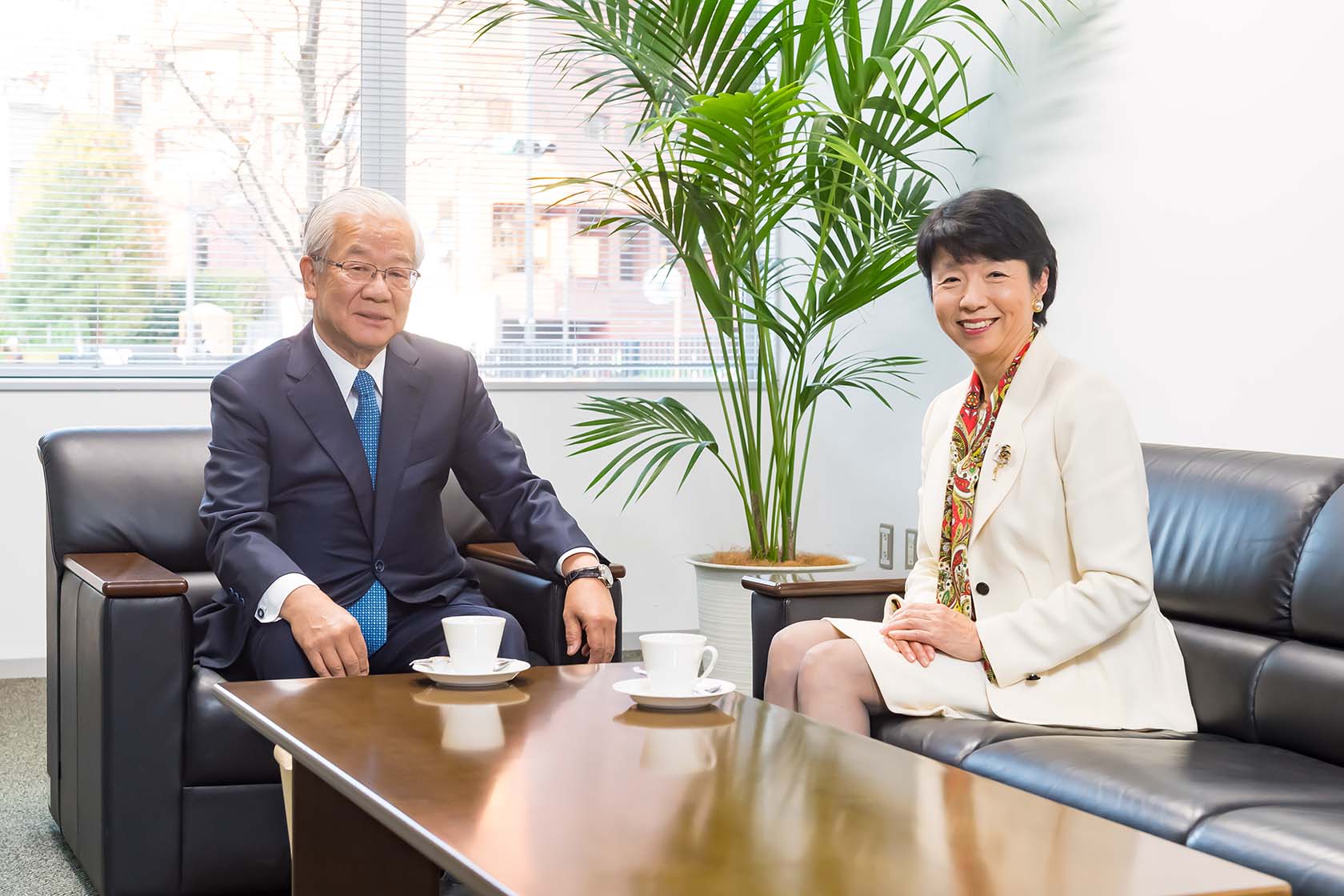Pensée Talk #3
Masayuki Oku (Honorary Advisor, Sumitomo Mitsui Financial Group) × Hiroko Ota (GRIPS Professor / Council Chair, Regulatory Reform Promotion Council, Cabinet Office)
(From the March 29, 2019 edition of Pensée)
For this third edition of Pensée, we asked Mr. Masayuki Oku, Honorary Advisor of the Sumitomo Financial Group, to exchange views with Dr. Hiroko Ota regarding the influence of new technologies, specifically FinTech and AI, on the financial industry, and the responses required of Japanese industry as a whole in this changing world economic scene.
Economic transformation: from the age of volume to the age of quality and innovation
ーVarious changes in the financial sector have had huge repercussions worldwide. What is your view of the Japanese economy and the world economy since the collapse of Lehman Brothers?
Oku The collapse of Lehman Brothers in 2008 obviously had a great impact on the financial industry, but I think it had an even bigger effect on industry in general, especially export-oriented industry. For some time after the collapse, Japan’s economic power slumped significantly. That was followed by the Great East Japan Earthquake in 2011, and an administration change in 2012. The new administration orchestrated a depreciation of the yen, and that finally paved the way for another round of economic growth. Under Abenomics, I think we are finally seeing the prospect of escape from deflation and improvement of the employment picture.
Ota The developed countries turned to monetary easing to overcome the abnormal situation that followed in the wake of the Lehman Brothers collapse. At present, one major problem is the apparent absence of any country or region that could serve as the driver of world economic growth. The rate of increase in productivity among developed and emerging economies is now even lower than it was before the Lehman Brothers crisis. In Japan, low productivity has long been an issue, and population aging is becoming increasingly serious.
Oku Japan is facing various issues related to social security costs and the consumption tax hike, which has been deferred. Financial problems are certainly a major concern for Japan.
Ota Japan was indeed able to extricate itself from the vicious circle of a strong yen and deflation — but if you asked me about the prospects for five years into the future, for example, I would have to say the country is still in a difficult situation.
Oku The outlook depends on the standards by which we view Japan’s current situation. Personally, with the continuing population decline owing to the falling birth rate, I think that we are no longer in an age for the conventional pursuit of volume, meaning the notion that the GDP has to grow by a certain percent or reach so many trillion yen. I believe we will be looking at the economy more on a per-capita basis, at issues such as the rise in individual income and improvement of the living environment—but even from that perspective, there will be a need for some kind of solution to the problem of widening income disparity.
Ota I would like to focus on the question of whether or not the current economy is conducive to the birth of new things. The unprecedented penetration of everyday life by digital technology can certainly be seen as one of the major changes since around 2017. Today, about one-third ofthe world’s entire population is connected to the Internet, and the terms AI and IoT are in common use. Not only are new technologies and business models being born at a rapid rate, but also those innovations are spreading very quickly. My area of expertise is regulatory reform, and personally I feel a sense of crisis about the future: Japan is not good at revising regulations and making systemic provisions in response to changes such as those we’re seeing today.
The influence of FinTech: One facet of overall financial business development
ーSpeaking of technical innovation, the spread of cashless payment systems in China constitutes a case of new approaches achieved by an emerging power through leapfrogging.* What are your views on the influence of AI and IoT technology in the financial industry?
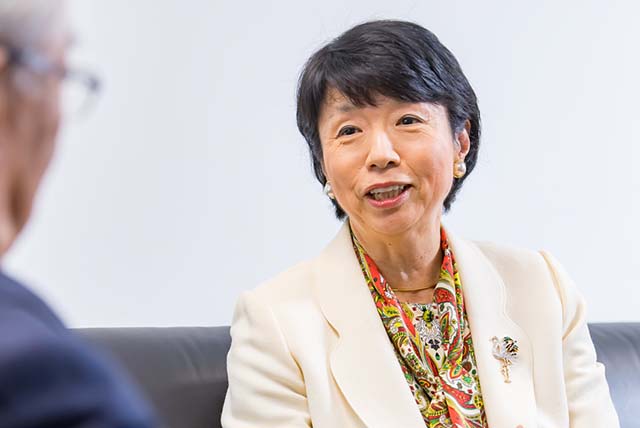
Oku The financial and banking industries have a history of adopting new technologies. Around the time of the Tokyo Olympics they introduced main frame computers to save clerical labor in office processes that had until then been done by hand, which was highly time-consuming; in the 1990s they began using server computers for risk management. Today, they are attempting to utilize technologies for intelligent operations including judgments. In that sense the aim of applying technologies has evolved with the changing times.
I understand that ‘finance’ in theterm ‘finance technology’ (or FinTech) comes from finis, the Latin word for ‘end.’ Here, however, it means ‘end’ in the sense of ‘objective.’ The substance of financing is the way in which money is used to achieve objectives. One of the financial functions which only banks are allowed to perform is deposits, which are the core of trust. However, other business types, such as loans and remittance & settlement, can generally be handled by other enterprises. That area is a field ripe for the application of FinTech, which is now largely serving the financing and banking industries.
ーIt is also said that the introduction of new FinTech mechanisms will result in a considerable reduction of bank staff. What will be the implications for banks?
Oku In the first place, I would like to talk about the predictions that FinTech will put banks out of business and AI will deprive bank employees of their jobs. While those conjectures capture one aspect of the issue, I do not think that they are giving consideration to the overall situation. Until now, the banking business has provided a wide range of uniform financial services to private customers of all ages and genders, and the same services to corporate customers—all receive the same services. In contrast, the new financial services arising with the advances in digital technology will deliver services and products tailored to each type of customer and to each field. The conventional banking business is not going to be totally replaced. Rather, it would be more correct to say that digital technology will enable banks to provide services more closely matched to the particular customer. Instead of recoiling from possible outcomes, banks should proactively embrace this technology. However, even if they introduce AI, the banks must still have the human resources needed to use the technology. Since it is human beings who must make the final decisions, humans must coexist with the technology, and banks must adopt the perspective that technology can be used to increase efficiency and synergy. That is another reason why I hope the Regulatory Reform Promotion Council led by Dr. Ota will thoroughly discuss the diversification of financial services arising from the inception of FinTech and other new technology.
* leapfrogging: making use of existing technology to spontaneously leap to the introduction of leading-edge technology without going through the usual phased development.
What Japanese industry needs: magnanimity to allow challenge
ーWhat guidelines do you suggest for the incorporation of new elements by Japanese industries, in the financial and banking sector and elsewhere?
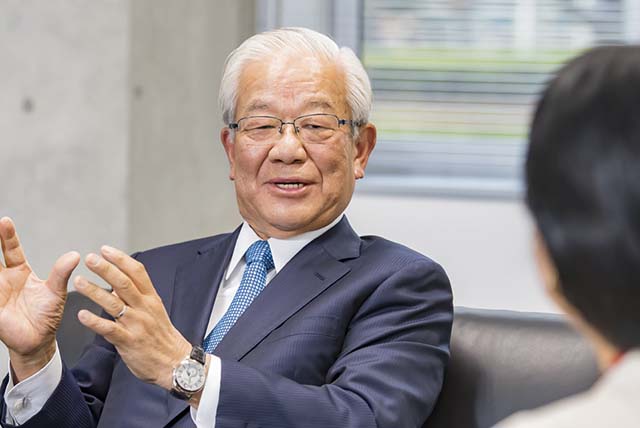
Oku I think that first, they should let their divisions try new things and then devise measures to address problems as they arise. This approach requires a certain patience and magnanimity. Ever since the beginning of the Meiji era in the mid-19th century, Japan has administered the nation’s affairs under laws and regulations based on civil law from the West. I have the feeling that our leaders are have a mind set that gives precedence to laws and regulations.
Ota I agree. In Japan, it is very hard for a superior to tell a subordinate, “Go ahead and try it.” It is difficult to change rules once they have been set in place here. Likewise, regulatory reform requires a lot of energy and time. Innovation is blocked when it is difficult to change things flexibly. Not only that, the industrial structure is now undergoing substantial change due to digitization. Diverse enterprises are entering various business segments, and products and services are being broken down to reflect that change. For example, the banking business is being broken down into segments such as deposits, loan screening, and settlements and remittances, and there are new entrants in each of those segments. In publishing too, we are seeing the collapse of the traditional top-down structure, where books written by authors are published by publishers and sent through agents to book stores, which then sell them to readers. Now books are distributed through the Internet, and a variety of parties have become suppliers of that content. In short, the industrial structure is acquiring a horizontal architecture; this is accompanied by the dissolving of boundaries between industries and the emergence of new businesses. In the sharing economy that is so widely talked about, the role played by platform enterprises such as Airbnb is an important one to note.
However, at present Japanese laws and regulations are based on “industrial law,” which is finely subdivided in terms of industrial classification: this makes it hard to respond to sweeping change. The work of reforming those systemic arrangements and regulations cannot keep pace with the emergent technological changes. Under these circumstances, new business possibilities encounter obstacles.
Oku That’s right. There are presumably many possibilities for the birth of new things through approaches that cross industrial boundaries, as exemplified by the fusion of financial and non-financial services. I say this because we are seeing many new trans-industry approaches surfacing in other countries, but often these are neglected in Japan since the concerned industries here do not have sufficient understanding of mutual value and type of use.
Ota That’s because one of the hallmarks of digital technology is that new approaches can be deployed on a global scale right from the start. Even in Japan, there are phenomena such as the inroads being made by overseas businesses with appealing platforms for the selling of goods that people no longer need, as exemplified by Mercari. The question is, then, how much innovationcan be triggered in domains where regulations and systemic arrangements are in place? I think this is a challenge of crucial importance for Japan.
ーFor Japanese industry, it is no longer a matter of competing in Japan alone; now the arena of competition is the whole world.
Oku Companies are not merely exporting; they are deploying M&A strategies in other countries, producing offshore, and getting dividend income from outside Japan. In these and other ways, industry itself has become fairly globalized. In the case of companies such as trading firms, that deal mainly in material resources, performance is greatly impacted by resource prices. Many companies have already shifted their weight toward other countries as part of their effort to find ways of stabilizing their business.
Ota Japanese companies have significantly globalized their operations. Recently even those in the restaurant and retail industries, where globalization has been lagging, have been increasingly moving into other Asian countries. I believe the service and agricultural industries can also do more to develop business outside Japan, since they have been pushed to excellence by the demands of Japanese consumers, who demand the best in flavor and quality.
Things to learn from Japan as it faces various issues
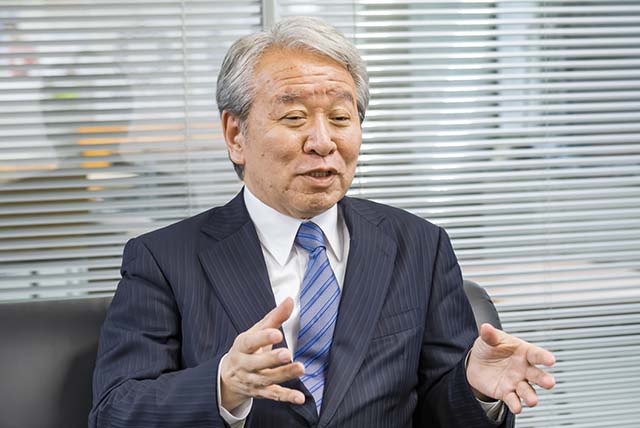
ーAbout two-thirds of GRIPS students come from countries other than Japan. What kind of perspective should they apply in their studies and what outlook would you like them to have when they graduate?
Ota When I take up issues facing the Japanese economy in my classes, the international students ask me why those issues cannot be resolved. They seem to feel that, in comparison with their own countries, which face problems of under developed infrastructure, huge income disparity, and insufficient education, Japan’s problems should be relatively easy to solve. That is true, but I would like them to understand that Japan needs not only to shape economic policy during periods of fast-paced growth but also to craft reform policy after such periods. Many Asian countries are going to face population aging in the coming years, so I would particularly like them to observe how Japan, whose population aging more advanced, is trying to find solutions. I would like the students to think together with us about this issue.
Oku Early 2017 saw the publication of a book titled, No Ordinary Disruption, which examines four global trends. The first is the shift of the center of economic activity from developed countries to emerging ones. The data show that ten years ago the share of the world’s combined GDP occupied by developed countries was 3.8 times that of emerging countries. However, that factor contracted to 1.5 times by 2016. The second is the global problem of population aging. The third is technical innovation centered around accelerating digitization. The fourth is the globalization of human resources, things, money, information, and services. These four trends are interrelated, and will probably accelerate simultaneously in emerging countries. While Japan is confronting many related issues ahead of other countries, it is experiencing considerable difficulty in its efforts to resolve those issues. I would like our international students to observe over time how Japan is grappling with those issues as it continues on the course of its democratization, which began after World War II.
ーWhat are your wishes for the Japanese students?
Ota Unfortunately, the international students are much more spirited that the Japanese. The Japanese students seem to pay too much attention to minor things. They are blessed with the opportunity to study at GRIPS, which attracts students from almost 50 countries in every corner of the world, and I hope they will be able to really feel the energy that comes with diversity, and thoroughly absorb it. In addition, I would like them to speak out freely and express their views fully.
Oku Japan has been learning from other countries for quite some time now, but mainly from Western countries. From this point onward, however, Japan is undoubtedly going to get many impressions through the youth of emerging countries, and learn a lot from them.
Ota I think so, too. It is important to learn about each other through direct contact. I hope that our Japanese students will take full advantage of the precious environment at GRIPS, actively communicating with others and building human networks.
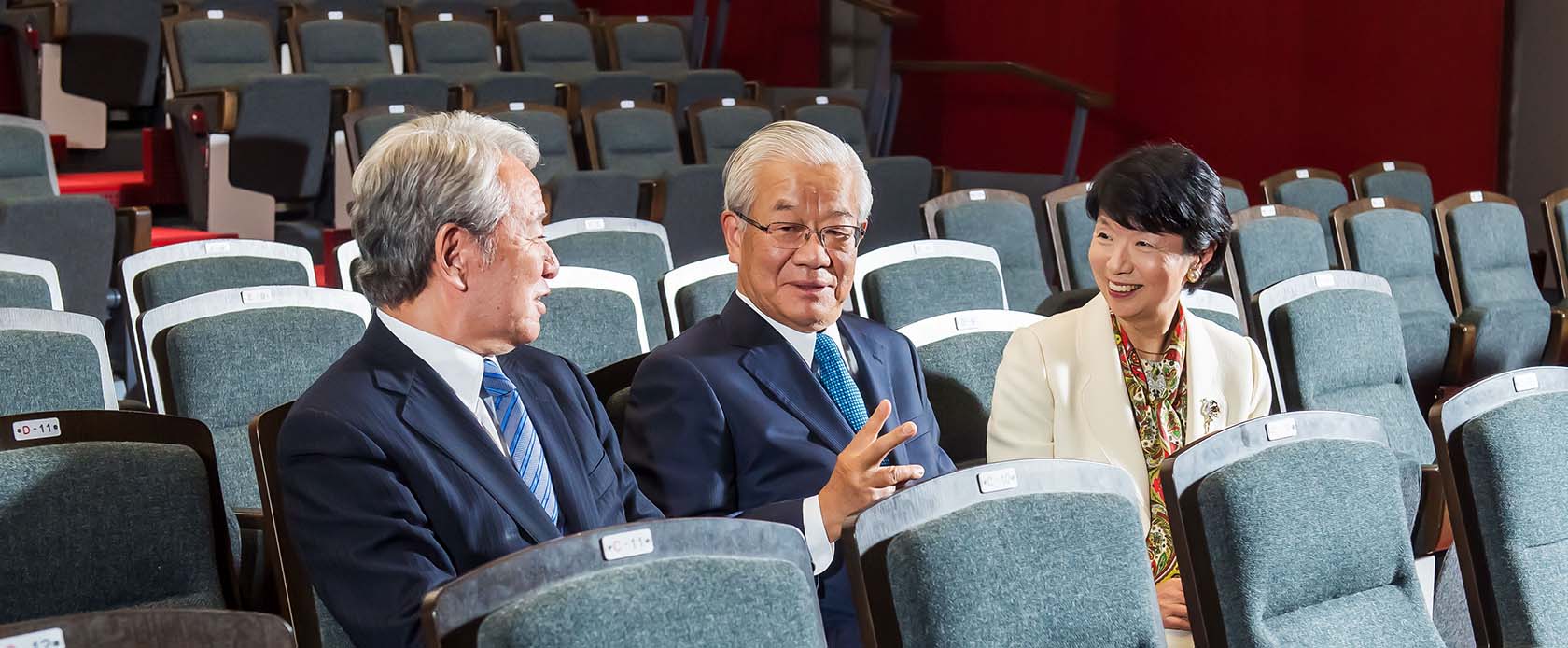
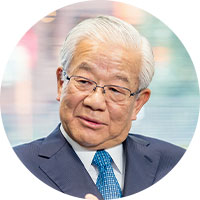 Guest
Guest
Masayuki Oku
A graduate of Kyoto University, Mr. Oku joined Sumitomo Bank in 1968. He has served as President of SMBC, Chairman of the Sumitomo Mitsui Financial Group (SMFG), Chairman of the Japanese Bankers Association and Vice-Chairman of the Japan Business Federation. He is now Honorary Advisor to SMFG.
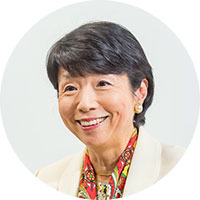
Host
Hiroko Ota
A graduate of Hitotsubashi University, Dr. Ota was appointed Professor at GRIPS in 2001. She served as a private-sector Cabinet member in the Minister of State for Economic and Fiscal Policy. She returned to GRIPS in2008. In 2016, she was appointed Chair of the Regulatory Reform Promotion Council.
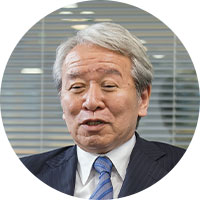
Host & Facilitator
Akihiko Tanaka
Akihiko Tanaka graduated from the University of Tokyo College of Arts and Sciences and from the Graduate School of Political Science of the Massachusetts Institute of Technology. President of GRIPS since April 2017, he has served as Vice-President of the University of Tokyo and President of JICA. His field of special expertise is international politics.




